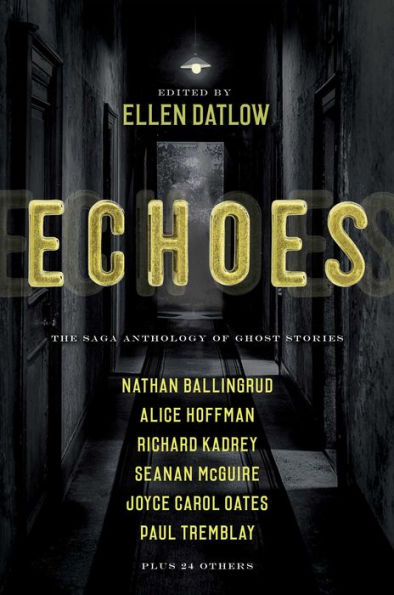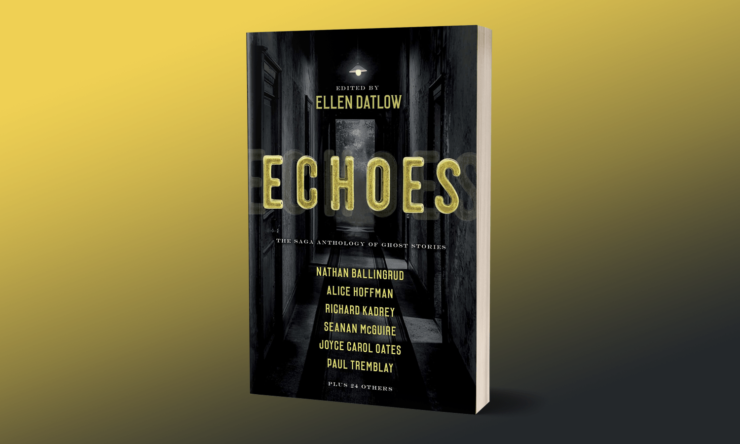“I don’t believe in ghosts, but I love ghost stories,” opens esteemed editor Ellen Datlow in her introduction to Echoes. The anthology’s central focus is the ‘ghost story’ but within that framework it ranges wide, across the world and through the decades, from familial dramas to wartime haunts and more. Echoes is an absolute behemoth of an anthology, with all pieces minus three reprints original to the book.
That makes for roughly seven hundred pages of never-seen-before spooky stories by writers ranging the gamut from Nathan Ballingrud to A. C. Wise, Stephen Graham Jones to Indrapamit Das, and so on. Stories are set in India, in Britain, in the US. Some are ghost stories with science fictional settings, others purely fantastical, others still realist—but there’s always the creeping dread, a specter at the corner of the story’s vision. The sheer volume of work Datlow has collected in Echoes fills out the nooks and crannies of the theme with gusto.
From legend to literature, pulp to high art, academy to zine, there are ghost stories—and Datlow has bridged many of these fields with the writers she’s collected together. Echoes allows the reader to compare and contrast expectations of genre as well as the shapes the ghost stories take given those expectations, which is especially fun when they’re all tucked next to each other. The stories are also individually of a high caliber, surprisingly varied though most of their narrative arcs bear certain similarities in tone and structure. Datlow delivers a compelling and satisfying collection of pieces that are either doing something new or doing the old thing just right.
One thing I noticed in several pieces was a vibe that the stories themselves are a bit haunted—by the past, through time. For example, there’s the anachronism of 1918 mashing into 2018 in the “The Unwrapping,” with a mummy-party and some lingering Tesla science set in the present moment. The prose of several stories hearkens to du Marier or Jackson, or even earlier pieces of ghostly fiction. Modernism is a specter hanging behind the creeping veil of pieces like Oates’s “The Surviving Child,” which reads with such a familiar energy I was fairly disoriented by the bare few reminders—like internet videos!—that it had a contemporary setting. Another thread I appreciated is that the uncanny or ghostly is not generally represented via the abject Other in most of these pieces, several of which are by writers of color, queer writers, et cetera. When that construction does appear, it tends to be purposeful, such as the queer revenge that Lee Thomas’s piece takes on its awful protagonist or in other stories’ explorations of gender (most specifically, the female ghost).
As for some of the stand-out stories included, there are a handful that lingered (longer). “A Shade of Dusk” by Indrapramit Das, set in Calcutta, takes the form of the journal of an elderly woman who seems to have developing dementia as she tries to keep track of her widowed sister and family. However, all is not as it seems, and the weight of age and time are as much the ghosts that haunt the piece as the lost sibling. Das spools out the protagonist’s long life through her journal alongside her own sense of it as incomplete without children or a husband of her own; Das also does a fine job exploring the tension of love and jealousy between siblings, run its course to the end. The story carries a sadness as well as a sense of calm that contrasts well with the straight-up horror of many of the pieces surrounding it.
Gemma Files’s “The Puppet Motel,” for example, scared me half to death. The gift Files has consistently shown for observational detail and affective impact has been honed to a precise knife over the years, especially when it comes to the macabre or unsettling. The raw human realities of this contemporary haunting—is it bad geometry, is it sick building syndrome; it is the protagonist, it is her situation, is it a real ghost—bind the reader up tight in the visceral experience of the protagonist when she is trapped by financial and romantic circumstance into inhabiting the terrible Air B&B she’s been watching over. It’s exceptionally horrifying and open ended in classic fashion; I loved it.
Buy the Book


Echoes: The Saga Anthology of Ghost Stories
One of the most complex stories in Echoes is “A Burning Sword for Her Cradle” by Aliette de Bodard. It is full of ghosts, and it is also a bleeding-sharp metaphor about colonization, refugee experience, and assimilation made literal via the spirits of the Federation and their punishing cruelty to the people they perceive as interlopers. No simple choices are on offer from the protagonist or her sister, between the choices they’ve made to survive and the prices they’ve paid. It’s a provocative, compelling piece—a solid favorite of mine from the book.
Nathan Ballingrud’s “Jasper Dodd’s Handbook of Spirits and Manifestations” was another story with a shivering-awful amount of emotional realism. The reader understands with mounting horror what the child protagonist does not, throughout, about his abusive father and the truth behind his missing mother and dead little sister. Also, as a person with an Appalachian-South background, the setting for the story and the tone of reference for the “spirits and manifestations,” placing the Holy Ghost alongside the hungry forest devils… well, I can’t express enough how much it moves (and terrifies) me. The horror here is both human and supernatural, truly, and Ballingrud has knocked it out of the park.
A. C. Wise’s “The Ghost Sequences” is one of the formally unique pieces, split as it is over multiple vignettes—all structured around the frame of a gallery piece by a four-person art collective that dissolved immediately upon creation of the work. The story that crawls out of the pieces is hair-raising; Wise’s delivery of sudden, escalating fear via one character’s background trauma stunned me in the best way. The imagery, focused as the piece is on the visual arts, is top notch and wildly unsettling. The references and other metafictional maneuvers recalled to me one of my favorite books, actually, Caitlin Kiernan’s The Drowning Girl. Exquisite tension and discomfort throughout.
Though other stories also had their own strengths and weaknesses, these were the best of the bunch. Echoes is a balanced book as a whole, though, and remains readable throughout its hefty length, never growing stale or repetitive despite the shared theme. While I wouldn’t recommend making a go at reading the entire thing at once, it maintains its tension through uninterrupted stretches of reading, buoyed along through Datlow’s skilled editorial arrangement to keep the pacing and approaches variable. As a fan of ghost stories I was immensely satisfied by the big tome, and I’d recommend it for anyone else who wants to curl up around a spooky yarn—some of which are provocative, some of which are straightforward, all of which fit together well.
Echoes is available from Saga Press.
Lee Mandelo is a writer, critic, and editor whose primary fields of interest are speculative fiction and queer literature, especially when the two coincide. They have two books out, Beyond Binary: Genderqueer and Sexually Fluid Speculative Fiction and We Wuz Pushed: On Joanna Russ and Radical Truth-telling, and in the past have edited for publications like Strange Horizons Magazine. Other work has been featured in magazines such as Stone Telling, Clarkesworld, Apex, and Ideomancer.










